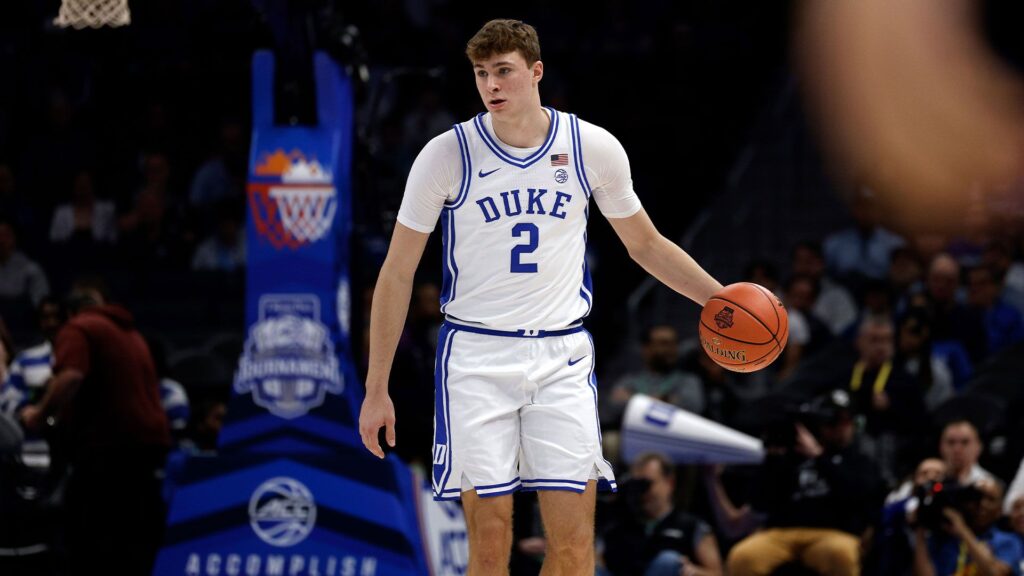PHOENIX — Cooper Flagg isn’t the best college basketball player in the country. He certainly wasn’t the best Duke player to have ever graced the court with his talents, and he’s not even the best “one and done” player that we’ve seen in recent years.
No, Cooper Flagg didn’t reach the apex of any of these categories, but what made him so incredibly popular this year was a different reason altogether. Flagg is one of the last few of a dying breed. For decades, freshmen across the country who had been highly recruited as high school athletes would have the opportunity to lead their teams to the ultimate levels of success in college basketball—the national championship. But as we continue to travel down the winding, controversial road of the transfer portal and NIL contracts, these types of characters will become few and far between.
Major college basketball programs have begun to move away from the process of recruiting 17-year-old phenoms like Flagg simply due to the risk of them not performing at the highest level possible.
This new model of recruiting players from mid- or low-major schools, who have already established their skills and dominance at a high level, has effectively begun to replace the old model of bringing in the most talented high school players straight to top-tier basketball programs like Duke, Gonzaga or St. John’s. These major programs are essentially the new “major league” of college basketball. The smaller, mid-major schools? Their farm system.
On Saturday, April 5, St. John’s head basketball coach Rick Pitino spoke about the current college basketball landscape, as well as the new revenue cap that’s been proposed by the NCAA, which will allow college athletes to receive up to 22 percent of the revenue generated annually by Power Conference schools.
“It bothers me a little that the money has gotten such that a young athlete will be making the most he’ll ever make in his life as a young person,” Pitino said.
Though it may seem like hyperbole, Coach Pitino is absolutely right, and the incentive to play college sports is slowly moving away from traditional motives like school tradition and championship probability to simply seeking the highest-paying contract available to the player.
If that’s the case, then try to put yourself in the shoes of one of these high school seniors who will graduate later this year. Which would you choose: going to a top program like Kentucky and sitting for a year or two while the upperclassmen play the majority of the time, or going to a mid-major program, average thirty points a game, and get paid like a professional athlete?
If you’re not going to play, you’re not going to make money. And if you’re not able to guarantee success for the program that’s recruiting you, they’re not going to pay you. Essentially, the more profitable option for these student athletes coming out of high school would be to take the “Travis Hunter route.” Go to a smaller program, play every minute of the game, rack up your deals with Nike and Subway, then transfer your sophomore season to a larger program having averaged 20 or more points per game as a freshman in college.
This new mentality of “chasing the bag” wasn’t determined by the players; it was determined by the programs. Coaches have begun to move away from taking a risk on the development of young athletes, and they’re now focusing most of their recruiting efforts towards obtaining the most talented players from other programs.
“A year ago we recruited three freshmen, and this year we’re not recruiting any,” Pitino explained when asked about what advice he’d give to high school seniors coming into college next season. “It’s a lot easier teaching older players than it is teaching younger players.”
The reason why Cooper Flagg mattered so much to the sports world this season was that he was the outlier to this new mode of thinking. As a 6 foot 9 inch freshman out of Maine — a state which traditionally has never produced high level basketball players — came into one of the most storied programs in college basketball history and nearly led them to a national championship.
Sure, this has been done before by the likes of Michael Jordan, Carmelo Anthony and Mike Bibby (to name a few), but this is something that we’re not likely to see for many years to come. As money continues to be the predominant decision-making factor for both college athletes and college sports programs alike, the days of the highly touted freshman coming into an elite college program and stealing the show are almost over.
Flagg was a gamble for Duke basketball, albeit one that paid off, but he’s also one of the last of these characters, and college basketball fans will soon have to learn to live without the likes of college freshmen phenoms like him.


